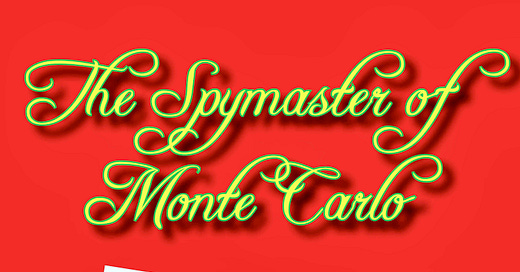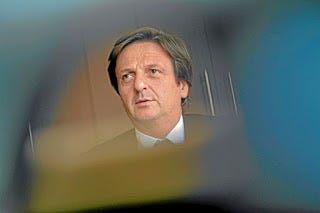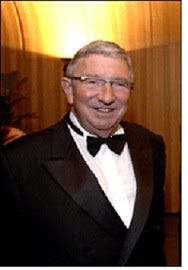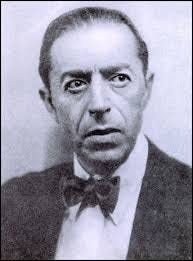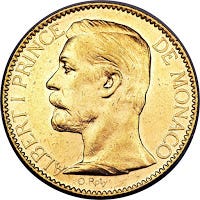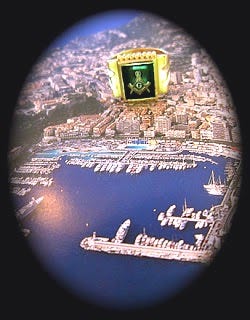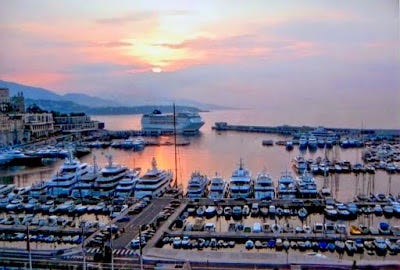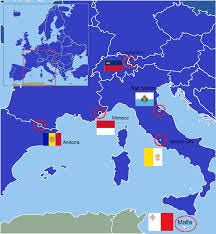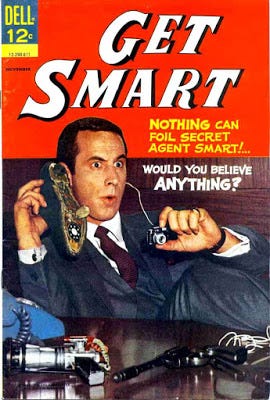THE SPYMASTER OF MONTE CARLO: 30) HIJACK ATTEMPT
A Throwback Thursday Memoir of Intrigue & Lunacy
November 2005
On November 1st, I had my first meeting, at M-Base, with Jean-Luc Allavena (or JLA, as I came to know him), about to become Prince Albert’s chef de cabinet, in charge of Palis de Monaco’s day-to-day operations.
JLA was tall and lean with a boyish shock of walnut hair he shook or wiped from his eyes.
He learned from me, for the first time, the existence of the prince’s unofficial intelligence service. I briefed him on our genesis and mission.
This astonished JLA.
Not because he had known nothing about it until this moment. But because less than one week before, Monaco's Minister of State, Jean-Paul Proust, had pigeonholed him and proposed… the formation of an intelligence service!
Clearly, Proust had learned of my service to the prince—and had embarked on a plan to vanquish it with a service of his own.
But JLA had already “connected the dots,” as he put it, and understood that “the [official] information networks at the Palace need cleaning out.”
JLA was dismayed that, as one of his final duties as lame-duck chef de cabinet, Raymond Biancheri, Franck’s father, had weaseled an honor for his corrupt son—Plenipotentiary—and leaked news of it to the media even before it was signed by the prince.
I briefed JLA on our most sensitive cases of internal corruption: Finance Minister Biancheri and Chief Judge Philippe Narmino.
I pointed out that the police—law enforcement—should be dealing with internal corruption, not my intelligence service, but the police department was in shambles and needed a new chief.
I also proposed enlarging SIGER (the police political unit) and providing it with better resources to tackle corruption properly.
I moved on to foreign residents, and how Simon Reuben had managed to buy his way back into Monaco through a Palace contact; how Umar Djabrailov, alleged murderer of Paul Tatum and others, had managed to quash his persona non grata status in Monaco; how Italians engaged in criminal activities queued up for citizenship in Monaco as protection from prosecution in Italy.
Incredulous and appalled, JLA concurred that a zero based review within the Palace and at all government ministries would be a fine way to proceed.
During the next two weeks, JLA told me, he would move from Paris to Monaco—and take up his duties, officially, on November 15th.
We agreed to meet in Paris before then.
When I met with Police Captain Yves Subraud that afternoon, he had some interesting news that matched what JLA had told me: Earlier in the week Minister of State Proust had requested police files on two men already on our radar screen: Dan Fischer/Francu (the Romanian) Umar Jabrailov (the Chechen).
Proust had also pigeonholed the prince with his idea of creating an intelligence service.
He and his allies, including Franck Biancheri, wanted to hijack the flow of intelligence. They had taken a good hard look at what the prince pledged to change (status quo corruption), realized intelligence was the means, and wanted to commandeer and control it.
With hindsight, I can see what must have occurred: DST Chief Pierre de Bousquet had been disingenuous, speaking out both sides of his mouth.
To me, he claimed the "The President of the Republic" was happy someone was assisting Prince Albert.
But the French were displeased by the un-officialness of our service, perhaps also by the American-ness of it. So he had quite likely suggested to Proust the formation of an official intelligence service. And—in the process—get rid of the American.
Sidney Reilly, ace of spies, said it best: Trust no one.
The prince and I met that evening at nine o’clock for a working dinner at a trendy restaurant called Fusion.
At my suggestion, Albert had phoned Monaco Mayor Georges Marsan to warn him off Dan Fischer/Francu.
As expected, Marsan was totally blown away by Albert’s knowledge.
So had Proust, who seemed amazed and somewhat perplexed by how well informed Albert was.
The prince was now reaping the benefits of having a good intelligence service at his disposal. And this gave him a feeling of empowerment.
“Knowledge is power,” I reminded him.
So, Albert asked me, what should he do about Proust’s insistence on creating an official intelligence service?
My answer: Tell him you are one step ahead—that you already have a plan to enlarge SIGER, the police intelligence unit. It needs two additional officers, greater operational security and more equipment.
Voila—an official intelligence service—one that the unofficial service—his own (run by me)—had already co-opted!
“Organize this with JLA,” Albert instructed.
CIA funding: My deputy had traveled to Guernsey to open an account through which we could receive badly needed funding on operations that served mutual interests.
Fine, said the prince.
Operation Scribe: Underway with USA Today.
Would the prince meet Newsweek’s Paris bureau chief for an interview?
Fine, he said, agreeing to cut around the Palace’s media representative and conduct the interview in his Paris apartment with me present.
I had a new project in mind; rather, a modern version of a century-old project:
The Prince’s great-great-grandfather and namesake, Prince Albert I, had in 1903 created an International Institute of Peace with a vision of using his principality to resolve foreign conflicts through arbitration.
I proposed that we revive this noble concept, in the prince’s name, as the Monaco Institute for Peace and Reconciliation.
We would endeavor to invite warring countries or factions to Monaco and try to resolve their differences in a discreet, neutral setting.
Such an institute would elevate the prince’s status as a world leader and provide him a platform as a global arbitrator—a role that once belonged to New Mexico Governor Bill Richardson during his years as a congressman—and would also benefit Monaco’s economy.
The prince gave this project his blessing and authorized me to pull the elements into place.
Next day, Proust moved in on JLA (again), pushing in high gear for an intelligence service that would be run by his crony, Alain Malric, a Frenchman who headed gambling enforcement in Monaco’s police department. (We already knew Malric was corrupt; that he had taken bribes and passed police data on Stephane Valeri to Franck Biancheri.)
Malric was a Freemason in GLNF, the same lodge as Proust.
(Malric, Proust and Franck Biancheri were a troika, and while Biancheri was himself not actually a Freemason, he apparently wanted to become a member of that Brotherhood. So Proust had taken him under his wing to become a member of a Freemason-"extension group” based in Paris called Club 100, previously called Horizon 2000. As its name suggests, it comprised of a hundred “outsiders” accepted by the Freemasons.)
Proust’s plan was a blatant attempt to politicize—if not outright hijack—the intelligence apparatus.
JLA put him off, saying the matter would be considered and revisited at the end of November, and continued to agree with me that it would make much more sense to build SIGER into something bigger, while also circumventing Proust’s plan.
That evening, the prince dropped by M-Base for dry martinis—Beefeater, two olives, up.
We sat on stools at the M-Base bar, one of the world’s great views: Monte Carlo, Cap Martin—and Italy’s twinkling lights in the distance.
I made Albert aware of what Proust was trying to construct with Malric.
He seemed amused.
Then I proposed my vision: To engage the intelligence services of Micro-Europe—Monaco, Luxembourg, Liechtenstein, Andorra, San Marino, and Malta—into an intelligence club, an association of services that would share information on bad actors and create a cooperative and combined shield.
The prince already held a soft spot for Micro-European countries, During his investiture, he extended to their representatives the same high regard and courtesy the same treatment provided to large, powerful countries.
Albert gave this idea his full backing.
I brought the prince up to date on other targets and operations, and he also took time to read our assessment of Islamic fundamentalist activity in and around Monaco.
Albert told me he would be in Paris the following week to sign Monaco’s new treaty with France and, as part of the pomp, would lunch one-on-one with Jacques Chirac, as requested by the French President.
“Should I mention you?” he asked.
“No, don’t bring it up,” I said. “Let’s see if he does.”
“What should I do if he says anything?” he asked.
“Thank him for the DST’s support and cooperation.”
Next day, the CIA's LIPS dropped down from Paris for lunch.
Sorry, miscreant, you're not seeing the prince.
LIPS couched, as his own idea, a plan the gang at CIA headquarters had proposed for a delegation of senior CIA officials to visit Monaco.
It was my hope such a visit would quash LIPS's constant obstruction of initiatives conceived in Langley.

